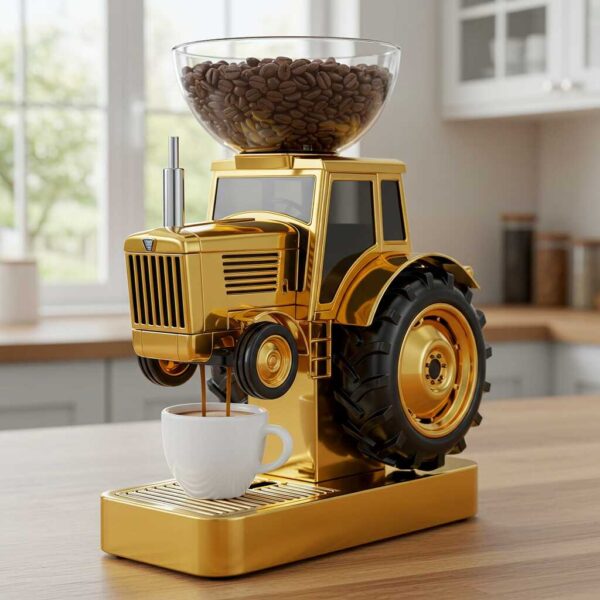In the early hours of dawn, when the world is still cloaked in a soft haze and the air carries the promise of a new day, there exists a ritual that transcends time and geography: the art of brewing coffee. For those who rise with the sun, whether they’re tending to fields or managing the demands of modern life, coffee is more than just a beverage—it’s fuel for the soul. Among the myriad ways to prepare this beloved elixir, one method stands out for its rugged charm and undeniable efficiency: tractor coffee makers. These ingenious devices embody the spirit of resilience and resourcefulness, transforming the humble act of coffee-making into an experience as robust and dependable as the machines they’re named after.
Tractor coffee makers are not merely tools; they are a testament to human ingenuity and adaptability. Designed with simplicity and functionality in mind, these coffee makers mirror the utilitarian ethos of tractors themselves—machines built to endure and perform under demanding conditions. Just as tractors are indispensable to farmers navigating vast expanses of land, tractor coffee makers have become essential companions for anyone seeking a reliable way to start their day. Their unassuming design belies a powerful capability to deliver rich, aromatic coffee without the need for intricate mechanisms or excessive maintenance. This guide delves deep into the world of tractor coffee makers, exploring their origins, mechanics, and cultural significance, while offering practical insights into how they can elevate your morning routine.
The purpose of this article is to provide a comprehensive exploration of tractor coffee makers, celebrating their unique role in the broader tapestry of coffee culture. Whether you’re a seasoned coffee enthusiast or someone simply looking to infuse your mornings with a touch of rustic charm, this guide will illuminate the ways in which these devices can transform your daily brew. By the end of this journey, you’ll come to understand why tractor coffee makers are not just about making coffee—they’re about embracing a lifestyle rooted in simplicity, durability, and a connection to the earth. So, grab your favorite mug, settle into your chair, and let’s rev up your morning by uncovering the ultimate secrets of tractor coffee makers.
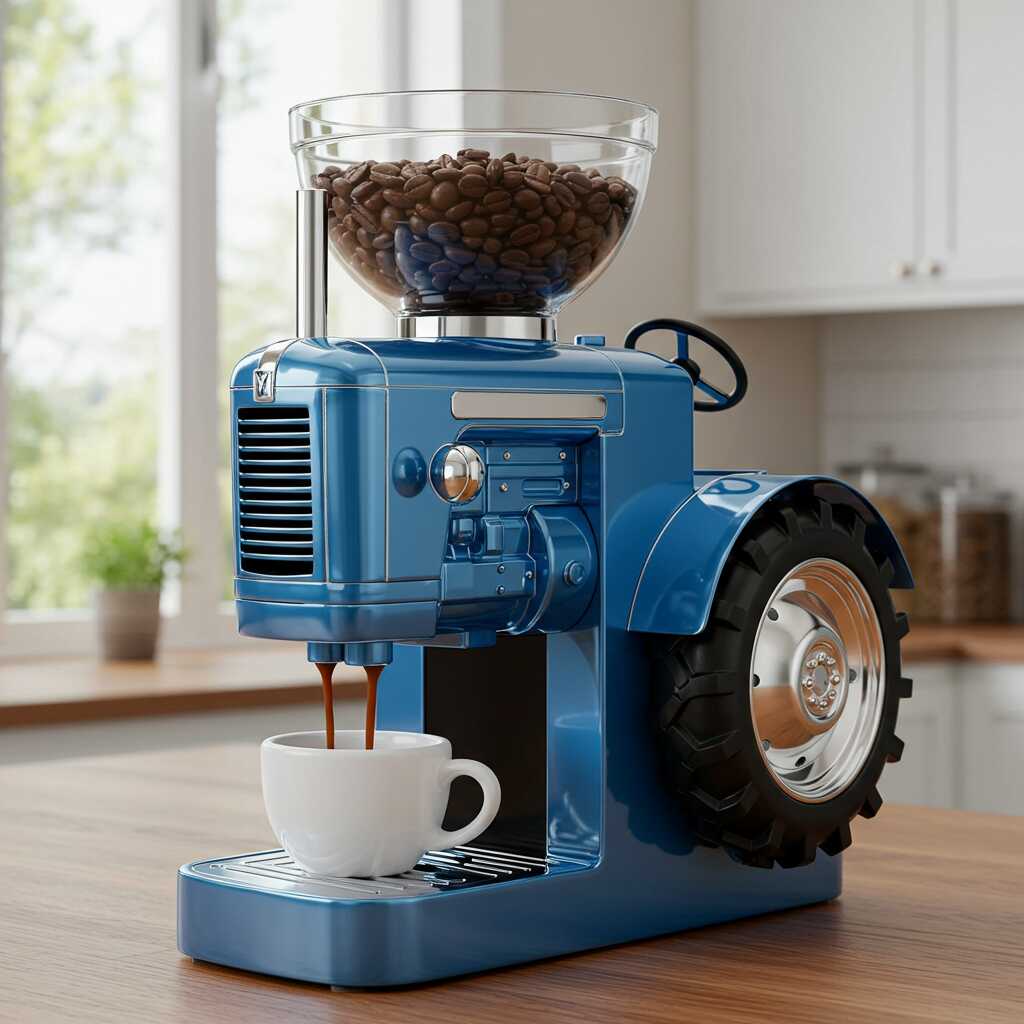
Contents
The Roots of Resilience: Tracing the Origins of Tractor Coffee Makers
To fully appreciate the enduring appeal of tractor coffee makers, it is essential to delve into their historical roots—a story intertwined with innovation, necessity, and the evolution of coffee culture. While the exact origin of tractor coffee makers remains somewhat anecdotal, their development can be traced back to the mid-20th century, a period marked by both industrial progress and the growing popularity of coffee as a daily ritual. During this era, coffee was no longer confined to urban cafes or domestic kitchens; it became a staple for workers in rural areas, where long hours and demanding tasks required a steady source of energy. Enterprising farmers and laborers, accustomed to improvising solutions with limited resources, began adapting simple percolators and stovetop brewers to function alongside their trusted tractors. These early iterations laid the groundwork for what would eventually evolve into the rugged, dependable coffee makers we know today.
The design principles behind tractor coffee makers reflect a philosophy deeply rooted in pragmatism. Unlike their sleek, modern counterparts, these devices prioritize functionality over aesthetics. Built to withstand harsh conditions, from dusty fields to unpredictable weather, tractor coffee makers are crafted from durable materials such as stainless steel or heavy-duty aluminum. Their straightforward construction eliminates unnecessary components, ensuring ease of use and minimal maintenance—a critical factor for individuals who rely on them in remote settings. The absence of electronic parts further underscores their resilience, allowing them to operate independently of power sources and making them ideal for outdoor environments. This deliberate simplicity is not just a design choice but a reflection of the values shared by those who depend on such tools: reliability, efficiency, and a steadfast commitment to getting the job done.
Cultural influences have also played a significant role in shaping the identity of tractor coffee makers. In many rural communities, coffee has long been more than a beverage—it symbolizes camaraderie, endurance, and the shared rhythms of hard work. Tractor coffee makers, with their ability to produce hearty, robust brews, became emblematic of this ethos. They were often central to communal gatherings, where farmers and laborers would pause their work to share stories over a steaming pot of coffee brewed directly in the field. Over time, these moments fostered a sense of connection not only among people but also between humanity and the land itself. The act of brewing coffee outdoors, surrounded by nature, reinforced a reverence for simplicity and self-sufficiency that continues to resonate with users today.
As coffee culture expanded globally, tractor coffee makers found their place within a broader narrative of authenticity and tradition. While urban trends leaned toward elaborate brewing methods and exotic beans, tractor coffee makers remained steadfast in their mission to deliver uncomplicated, satisfying coffee. This contrast speaks to their unique appeal: they represent a return to basics, a reminder of the intrinsic pleasures of a well-made cup without the distractions of modern excess. Even as technology advances and lifestyles shift, tractor coffee makers endure as a symbol of timeless craftsmanship and practical ingenuity. Their legacy serves as a bridge between generations, honoring the past while remaining relevant in an ever-changing world.
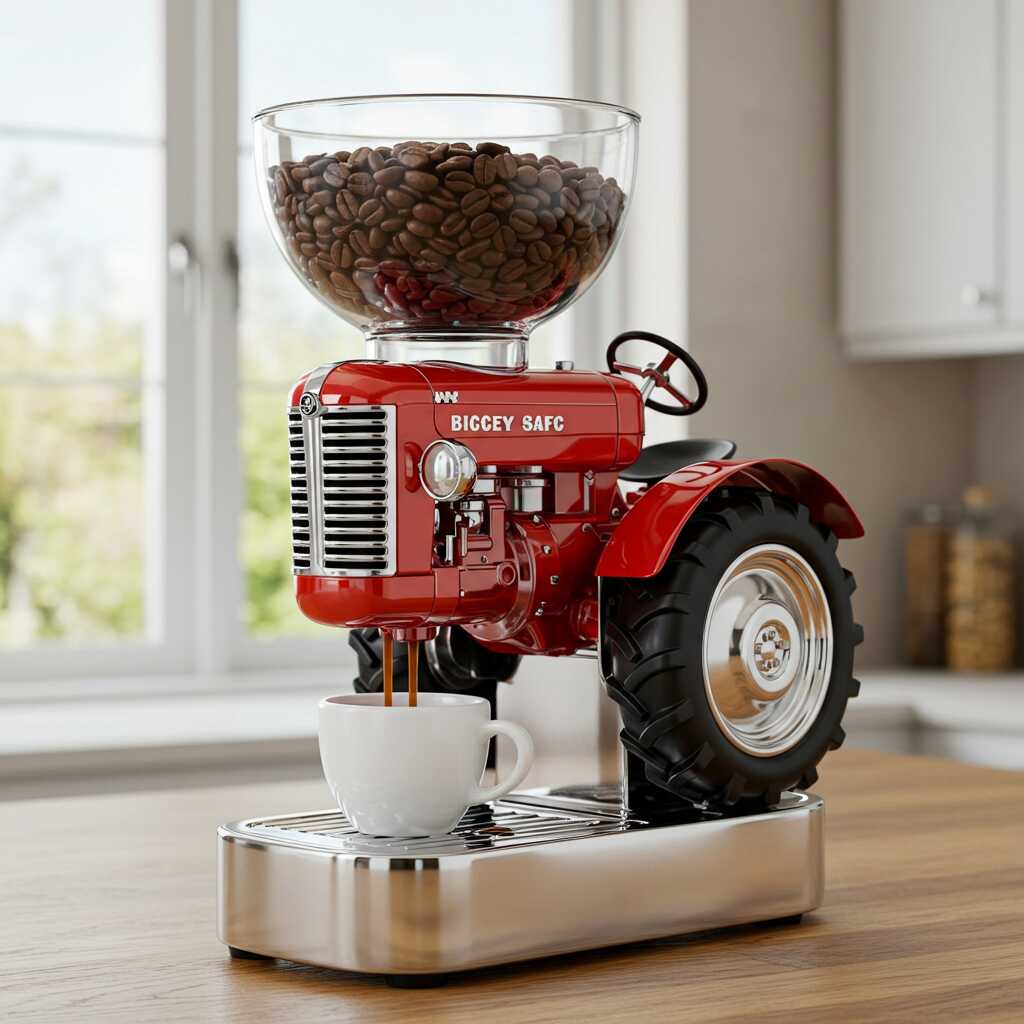
Mechanics of Simplicity: How Tractor Coffee Makers Work
At the heart of every tractor coffee maker lies a deceptively simple yet ingeniously effective mechanism designed to extract the full-bodied essence of coffee with minimal fuss. Unlike their high-tech counterparts, these devices eschew complex electronics and intricate components, relying instead on fundamental principles of heat transfer and gravity to produce a robust brew. Understanding the inner workings of tractor coffee makers reveals not only their practicality but also the thoughtful engineering that makes them so reliable in diverse environments.
The brewing process begins with the placement of coarsely ground coffee into a filter basket or chamber, typically made of durable metal mesh. This coarse grind is essential, as it allows water to flow freely through the grounds while minimizing sediment in the final cup. Once the coffee is loaded, the user adds water to a reservoir, which is then heated either by an open flame or a portable heat source. As the water heats, it generates steam pressure, forcing the hot liquid upward through a tube and into the coffee grounds. This percolation action ensures thorough extraction, allowing the water to absorb the rich flavors and aromas of the coffee before dripping back down into the collection chamber below.
What sets tractor coffee makers apart from other brewing methods is their reliance on natural forces rather than mechanical intervention. The absence of pumps or electrical elements means the device operates entirely on the principles of convection and gravity. This not only enhances its durability but also makes it highly adaptable to various settings, from campfires to tractor cabs. The lack of moving parts significantly reduces the risk of malfunction, ensuring consistent performance even under less-than-ideal conditions. Moreover, the straightforward design allows users to disassemble and clean the components with ease, maintaining hygiene and prolonging the lifespan of the device.
Another hallmark of tractor coffee makers is their emphasis on manual control. Users have the ability to adjust variables such as water temperature, brewing time, and coffee-to-water ratio, granting them a level of customization rarely found in automated systems. This hands-on approach fosters a deeper connection between the brewer and the process, encouraging mindfulness and intentionality. For instance, adjusting the heat source can influence the intensity of the brew, while experimenting with grind size and steeping duration allows for subtle variations in flavor profiles. Such flexibility empowers users to tailor their coffee experience to their personal preferences, whether they favor a bold, smoky cup or a smoother, more nuanced blend.
The materials used in constructing tractor coffee makers further contribute to their functionality and longevity. Stainless steel, a common choice for these devices, offers excellent heat conductivity and resistance to corrosion, making it ideal for outdoor use. Its non-reactive properties ensure that the coffee retains its pure taste without metallic undertones. Additionally, the sturdy construction of the components—such as reinforced handles and secure lids—enhances safety and usability, particularly in dynamic environments like moving vehicles or uneven terrain. These thoughtful design elements underscore the creators’ commitment to crafting a tool that is as practical as it is resilient.
Perhaps the most remarkable aspect of tractor coffee makers is their ability to distill the coffee-brewing process to its essence. By stripping away unnecessary complexities, these devices highlight the beauty of simplicity and the satisfaction of creating something meaningful with one’s own hands. Each step, from measuring the grounds to pouring the finished brew, becomes an act of intention—a ritual that honors the craft of coffee-making while aligning seamlessly with the demands of a busy, active lifestyle. It is this harmonious blend of form and function that makes tractor coffee makers not just a tool, but a companion for those who value authenticity, durability, and the joy of a perfectly brewed cup.
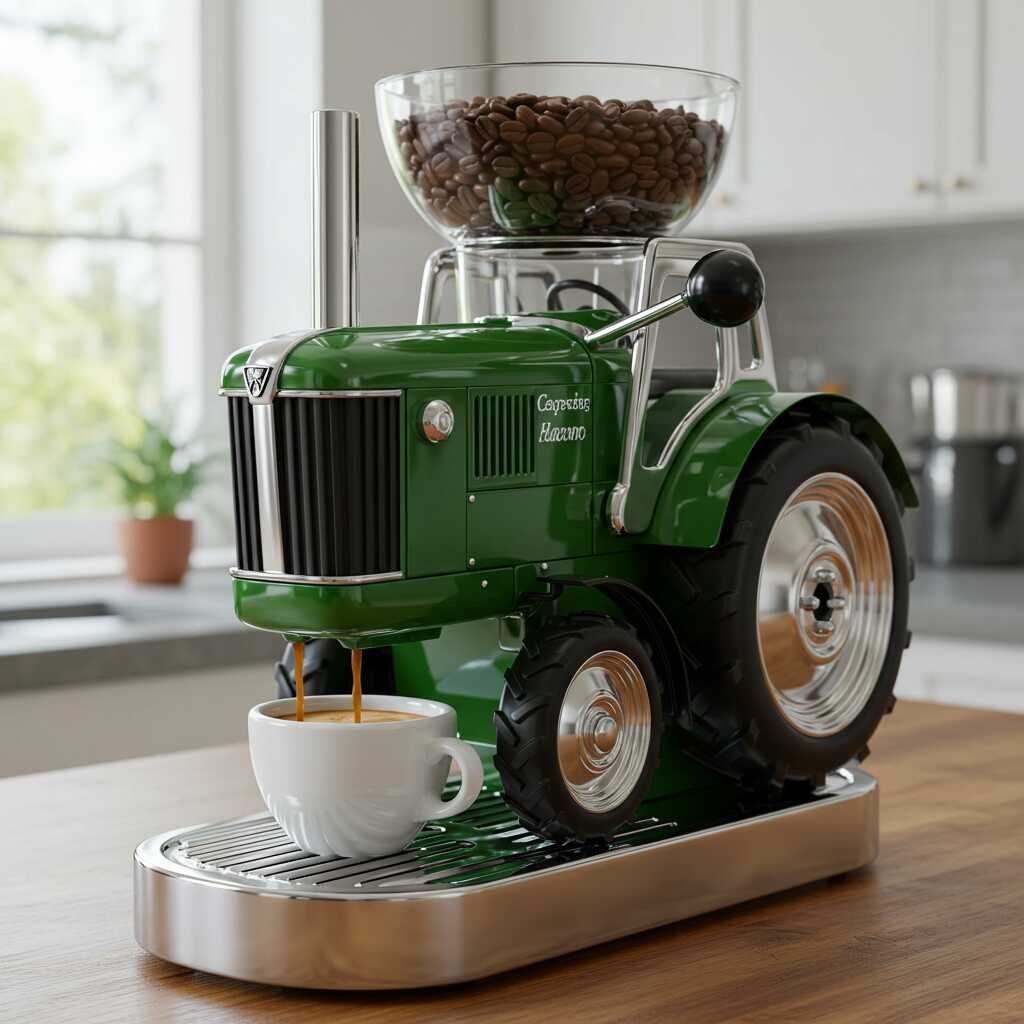
A Symphony of Strength and Flavor: Exploring the Unique Brewing Style of Tractor Coffee Makers
The brewing style of tractor coffee makers is a masterclass in extracting bold, robust flavors while preserving the nuanced characteristics of the coffee bean. Unlike other brewing methods that may emphasize precision or subtlety, tractor coffee makers excel at delivering a hearty, full-bodied cup that resonates with the rugged spirit of their design. This distinctive profile stems from the interplay of heat, pressure, and time—factors that are uniquely balanced in the mechanics of these devices. The result is a brew that speaks to the senses with an intensity and depth unmatched by more delicate approaches.
One of the defining features of tractor coffee makers is their ability to produce a concentrated extraction. The percolation process, driven by steam pressure, ensures that water repeatedly passes through the coffee grounds, maximizing contact time and extracting a rich array of compounds. This extended interaction allows for the release of oils and soluble solids that contribute to the coffee’s body and mouthfeel, creating a velvety texture that lingers on the palate. The coarse grind commonly used in these devices further enhances this effect, as larger particles slow the extraction rate, preventing bitterness while amplifying the inherent sweetness and complexity of the beans. For those who savor a strong, invigorating cup, the output of a tractor coffee maker is nothing short of transformative.
Temperature plays a crucial role in shaping the flavor profile of coffee brewed in these devices. Tractor coffee makers typically operate at higher temperatures compared to methods like pour-over or cold brew, which can range from 195°F to 205°F (90°C to 96°C). This elevated heat not only accelerates the extraction process but also unlocks deeper, roasted notes that might otherwise remain dormant. The result is a brew that highlights the darker, smokier tones of the coffee, complemented by hints of caramel, chocolate, or even spice, depending on the bean’s origin and roast level. These flavors are often described as “earthy” or “rustic,” evoking a sense of connection to the land and the raw materials from which the coffee is derived.
However, the advantages of tractor coffee makers extend beyond their ability to produce bold flavors. Their straightforward, manual operation allows users to exercise a degree of control that is often absent in automated systems. By adjusting variables such as the heat source, brewing duration, and coffee-to-water ratio, individuals can fine-tune the outcome to suit their preferences. For example, reducing the heat slightly can yield a mellower cup with softer acidity, while extending the brewing time can intensify the coffee’s strength and concentration. This adaptability makes tractor coffee makers versatile tools capable of catering to a wide range of tastes, from those who crave a punchy morning wake-up call to those who prefer a gentler, more contemplative sip.
Yet, like any brewing method, tractor coffee makers are not without their limitations. One potential drawback is the risk of over-extraction, particularly if the heat source is too intense or the brewing process is prolonged. Over-extraction can lead to an overly bitter or astringent flavor, overshadowing the coffee’s natural balance and complexity. To mitigate this, users must pay close attention to the brewing conditions and make adjustments as needed. Another consideration is the coarser grind required by these devices, which may not be suitable for all types of coffee beans. Delicate, lightly roasted beans, for instance, may lose some of their subtlety when subjected to the robust extraction process of a tractor coffee maker. As such, selecting the right beans and understanding their characteristics is key to achieving optimal results.
Despite these challenges, the strengths of tractor coffee makers far outweigh their limitations. Their ability to produce a consistently flavorful and hearty brew makes them an invaluable asset for anyone seeking a reliable source of caffeine-fueled energy. Moreover, the tactile, hands-on nature of the brewing process fosters a deeper appreciation for the art of coffee-making, encouraging users to engage with each step and savor the journey as much as the destination. Whether enjoyed alone in the quiet solitude of dawn or shared with others during a break in the field, the coffee brewed by these devices carries with it a sense of authenticity and purpose—a testament to the enduring allure of simplicity and strength.
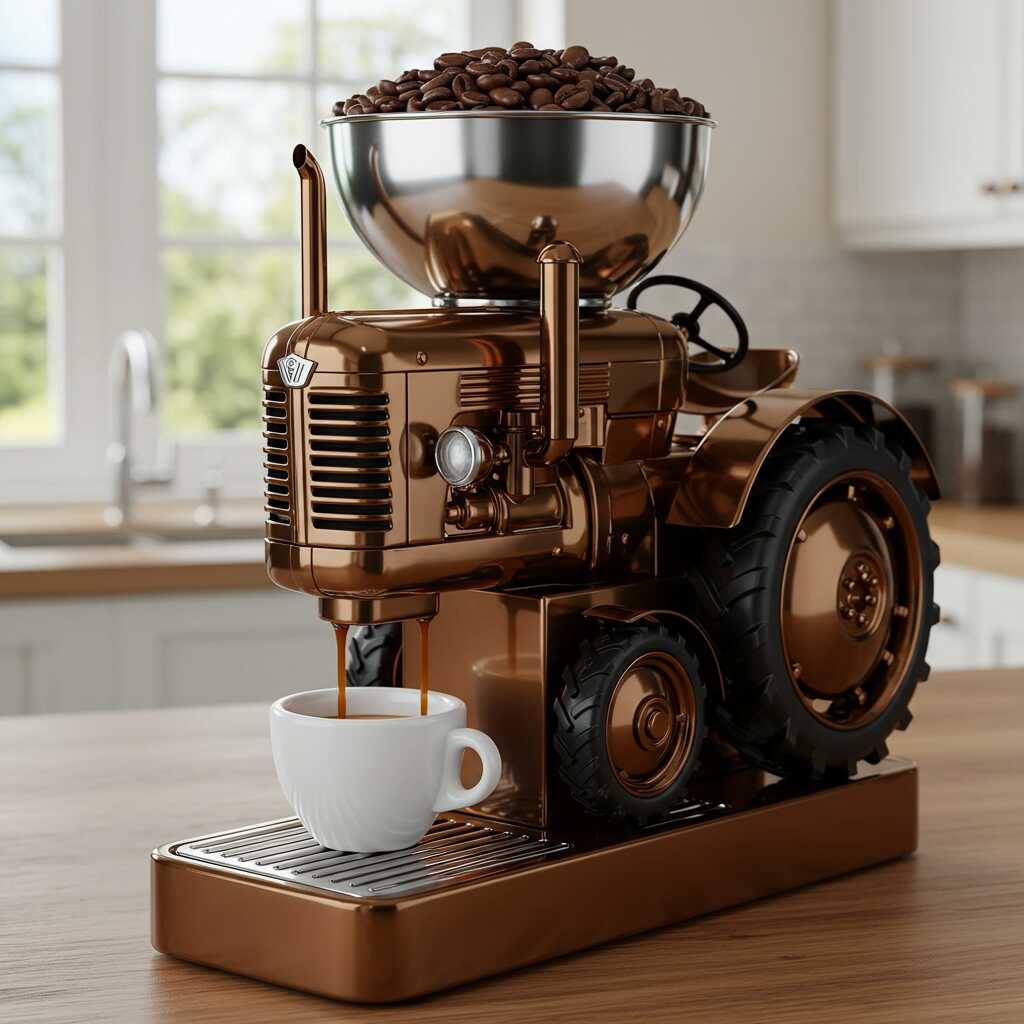
From Field to Table: The Versatility of Tractor Coffee Makers
The versatility of tractor coffee makers extends far beyond their namesake agricultural settings, positioning them as indispensable tools for a wide array of scenarios where resilience and adaptability are paramount. Whether you find yourself in the bustling heart of a city or amidst the serene expanse of untamed wilderness, these rugged devices prove their worth time and again, seamlessly integrating into diverse environments and lifestyles. Their portability, durability, and straightforward operation make them ideal companions for anyone seeking a reliable way to brew coffee on the go, regardless of the circumstances.
For outdoor enthusiasts, tractor coffee makers are nothing short of a revelation. Picture a group of hikers pausing beside a babbling brook, the morning mist clinging to the trees as they unpack their gear. With a small campfire crackling nearby, the tractor coffee maker takes center stage, effortlessly transforming fresh water into a steaming pot of invigorating brew. Its ability to operate without electricity or specialized equipment renders it perfect for such adventures, where simplicity and resourcefulness reign supreme. Backpackers, too, benefit from its compact design and lightweight materials, allowing them to carry it with ease while traversing rugged trails. Even in the most remote corners of the wilderness, where modern conveniences are scarce, a tractor coffee maker ensures that the comforting ritual of coffee remains accessible—a reminder of home amid the wild.
Equally impressive is the device’s utility in emergency situations, where access to basic amenities may be compromised. Natural disasters, power outages, or unexpected breakdowns can disrupt daily routines, leaving individuals scrambling to adapt. In such moments, the tractor coffee maker emerges as a beacon of reliability, requiring nothing more than a heat source and a supply of water to function. Imagine a family gathered around a portable stove in the aftermath of a storm, sharing a warm cup of coffee brewed in their trusty device. Beyond its practical benefits, this simple act fosters a sense of normalcy and connection, providing comfort and reassurance during uncertain times. Similarly, first responders and aid workers operating in challenging conditions often rely on tractor coffee makers to sustain their energy and morale, underscoring the device’s role as a lifeline in moments of crisis.
Urban dwellers, though perhaps less inclined to associate tractor coffee makers with their fast-paced lifestyles, can also reap significant benefits from their inclusion in daily routines. The rise of minimalist living and the growing preference for sustainable practices have led many city residents to seek alternatives to bulky, energy-intensive appliances. Tractor coffee makers fit neatly into this ethos, offering a space-efficient solution that aligns with eco-conscious values. Apartment balconies, rooftop gardens, and community spaces become impromptu cafés, where neighbors gather to enjoy freshly brewed coffee prepared with minimal environmental impact. Furthermore, their manual operation encourages a slower, more mindful approach to coffee-making—an antidote to the relentless pace of urban life and a chance to reconnect with the sensory pleasures of the process.
Even in professional settings, tractor coffee makers find their niche. Construction sites, film shoots, and outdoor events often present logistical challenges that render traditional coffee machines impractical. Here, the rugged build and portability of tractor coffee makers shine, enabling teams to maintain productivity and camaraderie with a steady supply of caffeine. Workers taking a brief respite from their tasks can bond over a shared pot of coffee, reinforcing the social dimension of the beverage and creating opportunities for collaboration and relaxation. Similarly, food trucks and mobile vendors incorporate these devices into their operations, leveraging their durability and efficiency to serve customers without compromising on quality or consistency.
Ultimately, the adaptability of tractor coffee makers lies in their ability to transcend context, bridging gaps between different environments and needs. They embody a universal appeal, uniting people through the shared experience of coffee while catering to the unique demands of each situation. Whether in the great outdoors, during emergencies, or within the confines of urban living, these devices stand as symbols of resilience and resourcefulness. Their presence reminds us that, despite the complexities of modern life, there is enduring value in simplicity—and that a well-brewed cup of coffee has the power to bring people together, no matter where they are.
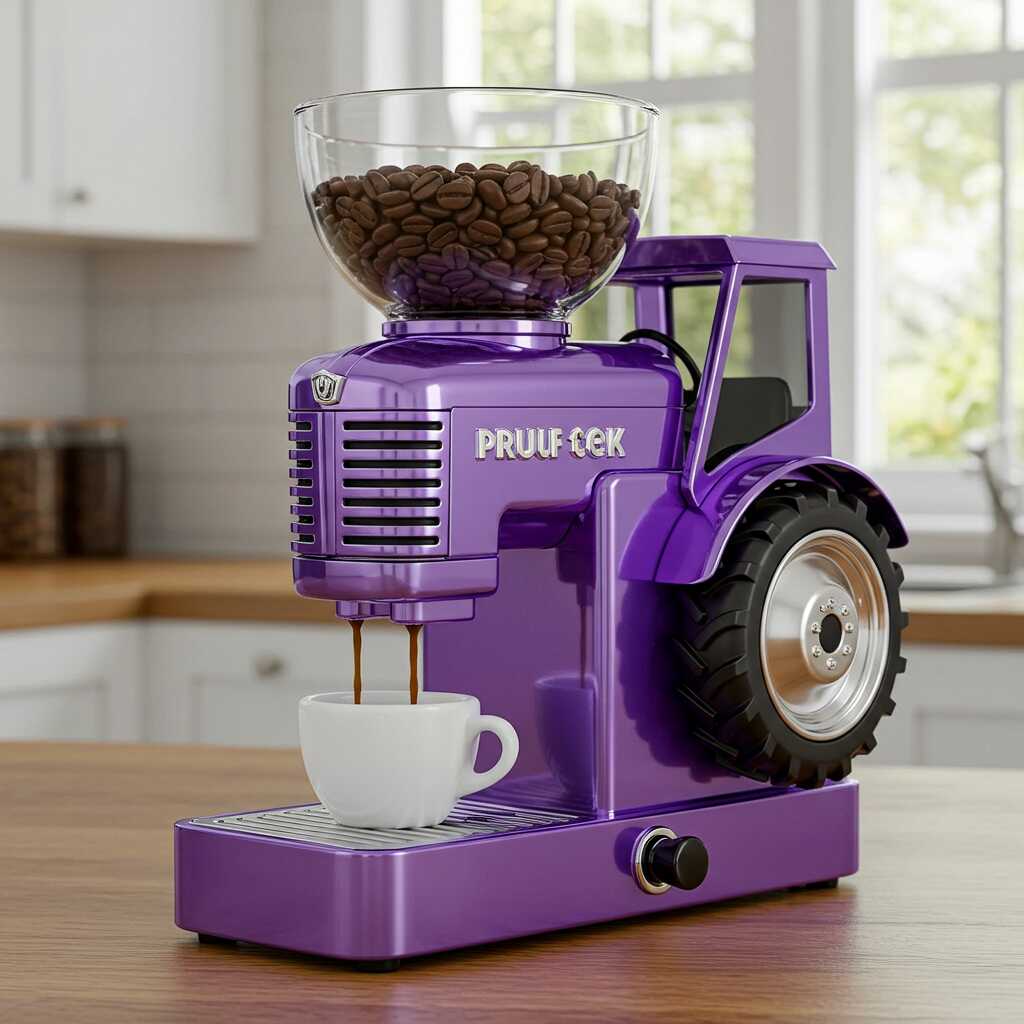
Crafting the Perfect Brew: Mastering the Art of Tractor Coffee Makers
Achieving the perfect cup of coffee with a tractor coffee maker requires a blend of knowledge, patience, and attentiveness. While these devices are celebrated for their simplicity and durability, unlocking their full potential hinges on mastering the nuances of preparation. From selecting the right beans to fine-tuning the brewing process, every step contributes to the final outcome—a robust, flavorful brew that captures the essence of the coffee. Below, we explore the key factors that influence the quality of your coffee and offer practical tips to elevate your brewing experience.
Selecting the Right Beans
The foundation of any great cup of coffee begins with the beans. When using a tractor coffee maker, it is essential to choose beans that complement the device’s robust extraction process. Opt for medium to dark roasts, as their bold flavors and pronounced body are well-suited to the intense brewing style of these devices. Lighter roasts, while delicate and nuanced, may lose their subtleties under the heat and pressure of a tractor coffee maker, resulting in a cup that feels underwhelming or imbalanced. Additionally, consider the origin of the beans. Coffees from regions like Brazil, Sumatra, or Ethiopia often exhibit earthy, chocolatey, or spicy notes that harmonize beautifully with the rustic character of tractor-brewed coffee. Freshness is equally important; aim to purchase whole beans and grind them just before brewing to preserve their aroma and flavor.
Grinding Consistency
Grind size plays a pivotal role in determining the quality of your coffee. Tractor coffee makers are designed to work best with coarse grinds, similar to those used for French press brewing. A coarse grind slows the extraction process, preventing over-extraction and ensuring that the coffee retains its natural sweetness and complexity. If the grind is too fine, the water will pass through too quickly, leading to a weak brew, while excessively large particles may result in under-extraction and a flat, watery cup. Investing in a quality burr grinder can help you achieve the ideal consistency, allowing for greater control over the texture of your grounds.
Water Quality
The importance of water cannot be overstated when brewing coffee. Tractor coffee makers rely on water as the primary medium for extracting flavor, making its quality a critical factor in the final product. Always use filtered or bottled water, as tap water often contains impurities and minerals that can impart off-flavors or cloud the coffee’s clarity. Additionally, pay attention to water temperature. While the device itself regulates heat, starting with preheated water can enhance the brewing process, ensuring that the coffee grounds are exposed to optimal temperatures from the outset.
Brewing Time
Brewing time is another variable that requires careful management. Tractor coffee makers operate on a percolation system, where water repeatedly cycles through the coffee grounds. While this method maximizes extraction, it also increases the risk of over-extraction if left unchecked. Aim for a brewing time of 5 to 7 minutes, depending on your desired strength and flavor profile. For a milder cup, reduce the brewing time slightly, while extending it can yield a more intense brew. Monitoring the process closely and tasting periodically can help you strike the perfect balance.
Cleaning and Maintenance
Proper cleaning and maintenance are essential to preserving the performance and longevity of your tractor coffee maker. After each use, disassemble the device and rinse all components thoroughly to remove residual coffee oils and grounds. A buildup of these residues can affect the flavor of future brews and compromise the device’s efficiency. Use a mild detergent and a soft brush to clean stubborn areas, avoiding abrasive materials that could damage the finish. Periodically inspect the gaskets and seals for signs of wear, replacing them as needed to ensure a secure fit and prevent leaks.
Experimentation and Personalization
Finally, don’t be afraid to experiment with your brewing process. Tractor coffee makers offer a level of manual control that invites creativity and exploration. Try adjusting variables such as the coffee-to-water ratio, grind size, or heat source to discover what works best for your palate. Consider incorporating spices like cinnamon or cardamom into the grounds for a unique twist, or experiment with blending different types of beans to create a custom flavor profile. The beauty of these devices lies in their adaptability, empowering you to craft a cup of coffee that reflects your individual tastes and preferences.
By paying attention to these factors and embracing the art of experimentation, you can unlock the full potential of your tractor coffee maker. Each cup becomes an opportunity to refine your technique and deepen your appreciation for the craft of coffee-making. With practice and patience, you’ll soon find yourself producing brews that are not only satisfying but truly exceptional—a testament to the harmony of simplicity and skill.
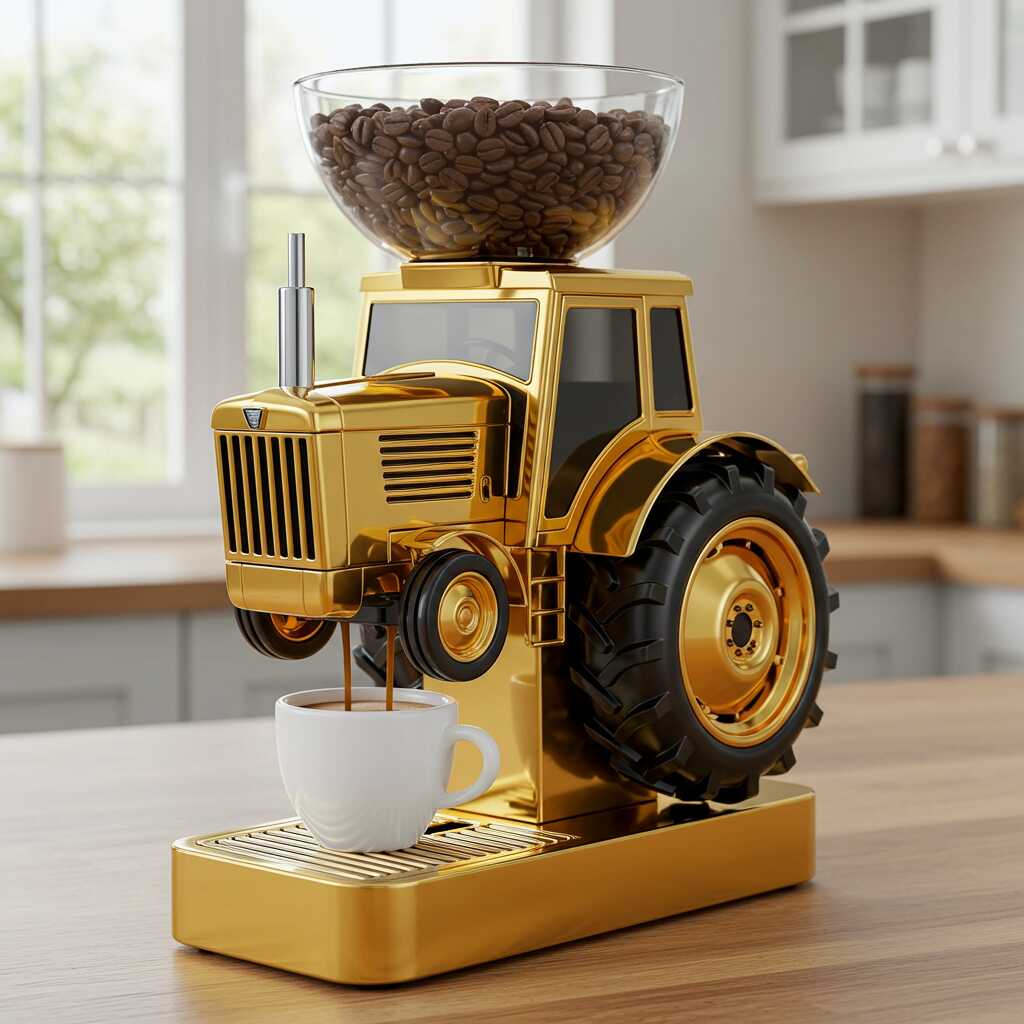
A Legacy of Simplicity: The Enduring Appeal of Tractor Coffee Makers
The journey through the world of tractor coffee makers reveals far more than a mere method of brewing coffee—it unveils a philosophy, a way of life that champions simplicity, resilience, and connection. At their core, these unassuming devices embody the essence of what it means to embrace the fundamentals, stripping away the superfluous to focus on what truly matters. In an age increasingly defined by complexity and constant innovation, tractor coffee makers stand as a poignant reminder of the enduring value of straightforward solutions. Their design, devoid of unnecessary embellishments, speaks to a profound truth: sometimes, the most impactful tools are those that do one thing exceptionally well. By prioritizing functionality and durability, they offer a counterbalance to the fleeting allure of novelty, grounding us in the tangible and the enduring.
Beyond their practical utility, tractor coffee makers foster a deeper relationship with the act of coffee-making itself. Unlike automated systems that distance the user from the process, these devices invite participation and mindfulness. Every step—from measuring the grounds to monitoring the brew—becomes an opportunity to engage with the ritual, to savor the anticipation of a perfectly crafted cup. This tactile involvement transforms coffee from a mere beverage into an experience, one that resonates with the rhythms of daily life. Whether brewed in the solitude of dawn or shared with others during a momentary pause, the coffee produced by these makers carries with it a sense of intention and care, qualities that are often lost in the rush of modern living.
Moreover, tractor coffee makers serve as bridges between people and places, weaving together disparate threads of culture and environment. They are as at home on a farmer’s tractor as they are in the backpack of a wilderness explorer or the kitchen of an urban minimalist. This adaptability underscores their universal appeal, transcending boundaries to unite individuals through a shared appreciation for authenticity and resourcefulness. In doing so, they remind us of our interconnectedness—not just with each other, but with the natural world and the traditions that shape our lives.
As we reflect on the significance of tractor coffee makers, it becomes clear that they are more than tools; they are symbols of a lifestyle that values substance over spectacle. They challenge us to reconsider our priorities, to find beauty in simplicity, and to embrace the enduring power of craftsmanship. In a world that often feels overwhelming, these devices offer a sanctuary—a way to rev up our mornings with purpose and meaning. So, the next time you reach for your tractor coffee maker, take a moment to appreciate not just the coffee it produces, but the values it represents. Let it inspire you to live deliberately, to cherish the rituals that ground you, and to celebrate the quiet strength found in the simplest of things.

